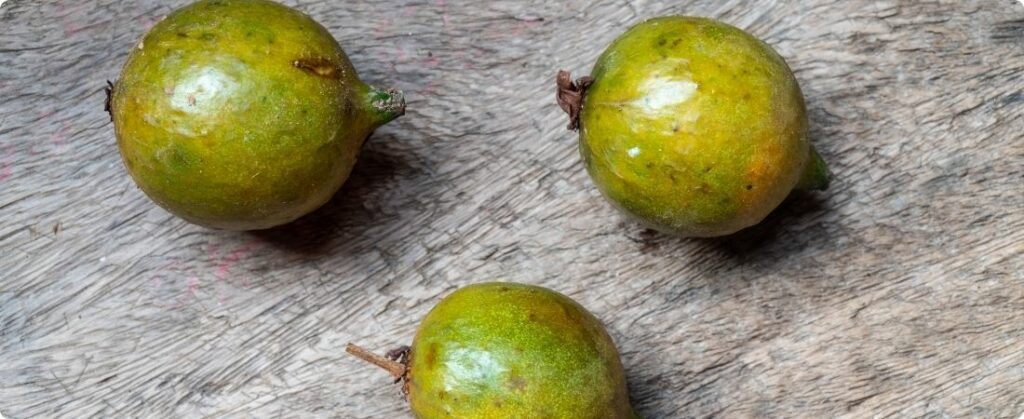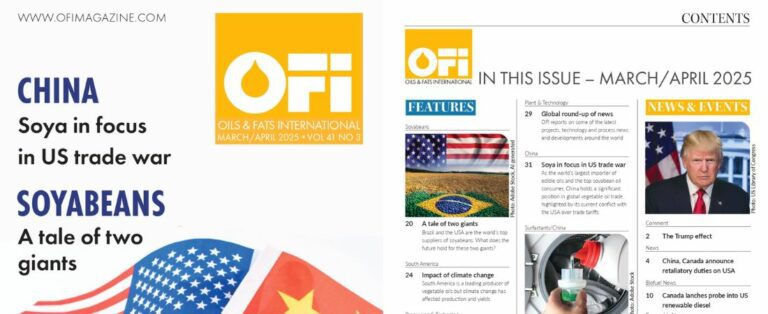
With the growing search for sustainable solutions and diversification of sources for the production of biofuels, cosmetics and other industrial products, macauba has emerged as a promising alternative. Macauba oil is a vegetable oil extracted from the palm tree Acrocomia Aculeata, a species native to South America, especially the Brazilian savannah. This palm tree is highly resistant and adaptable, producing fruits rich in oil that, for centuries, have been used by local communities in various applications. In recent years, macauba oil has gained prominence in the national and international market due to its unique properties and versatility of use. In addition, macauba stands out for its high oil productivity per hectare, surpassing other oilseeds, such as soy and palm.
Fruit composition
Macauba fruits are greenish-yellow in color when immature and turn brown when fully ripe. They grow in clusters containing 200 to 600 units per palm tree, arranged in groups of 4 to 7 units, and have a rich and well-defined composition:
- Pulp (Mesocarp): It represents 46.7% of the fruit weight and has a fibrous texture and yellow color. It is rich in oil content (26–52%), predominantly composed of unsaturated fatty acids, with emphasis on oleic acid (55–65%).
- Almond (Endosperm): It is the smallest fraction of the fruit (6.3%), with a high oil content (50–56%). It concentrates saturated fatty acids, with emphasis on lauric acid, which represents approximately 40%.
Production areas
Due to the growing demand for its products, macauba cultivation has expanded to other regions of Brazil and to Latin American countries, such as Paraguay, where it is known as Mbokaja and is widely present in the eastern region, mainly on properties of small producers.
Brazil, which has the largest production potential, invests heavily in research on macauba, especially with regard to the production of biofuels from its oil. Interest in this plant is also growing in other parts of the world, boosting investment in the sector.
Oil applications
Macauba oil has a wide range of applications due to its composition rich in fatty acids, vitamins and antioxidants. Among the main applications, we have:
- Food;
- Cosmetics;
- Biofuels;
- Pharmaceutical industry.
Although the macauba oil sector is promising, it faces considerable challenges, such as the lack of adequate infrastructure in the producing regions, which makes it difficult to collect and process the fruits. Overcoming these obstacles requires increased investment in research and development to improve macauba varieties, oil extraction and refining processes, and applications for derived products.
Industry challenges
Macauba oil has been highly valued as a potential feedstock for biofuels, especially in the context of global energy transition and reduction of greenhouse gas emissions. Some countries with green energy policies, especially in Europe and the United States, are evaluating macauba as an alternative to palm and soy, as it can be grown in a more sustainable manner compared to these oilseeds.

One of the challenges of the international market is the scale of production. Although Brazil has the largest potential for cultivation, the volume of macauba oil currently produced is still small compared to other oilseeds, such as soybeans or palm oil. However, the demand for sustainable and environmentally responsible products is growing. In this context, the global macauba market is expected to expand. This growth depends mainly on the improvement of cultivation and processing technologies.
Opportunities in the international market
Brazil has established partnerships with other Latin American countries. It has also collaborated with nations outside the region. The goal of these initiatives is to expand research and development into macauba cultivation. Paraguay, for example, has a long tradition of growing macauba and, together with Brazil, is exploring the cultivation and use of this oil further. This could help create a stronger regional market that can expand beyond the borders of Latin America.
These factors indicate a promising scenario for macauba oil in the international market. However, the sector still faces significant challenges. Among them, inadequate infrastructure, limited scale of production and adaptation to the specific needs of each market stand out.
In summary, the macauba oil sector has vast growth potential, but it also faces challenges that need to be overcome. With the right support, this sector can play a strategic role in the Brazilian economy, promoting innovation, sustainability and strengthening national agriculture.
By Maila Dias | Palm oil and lauric oil specialist at Aboissa
Review by Vanessa Ferreira















